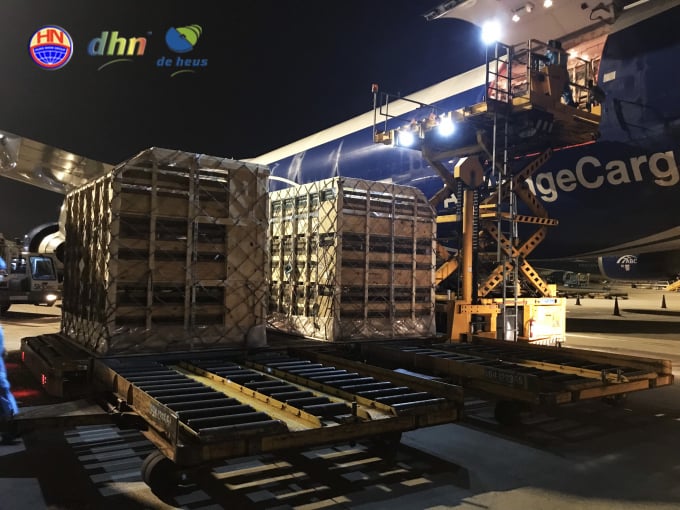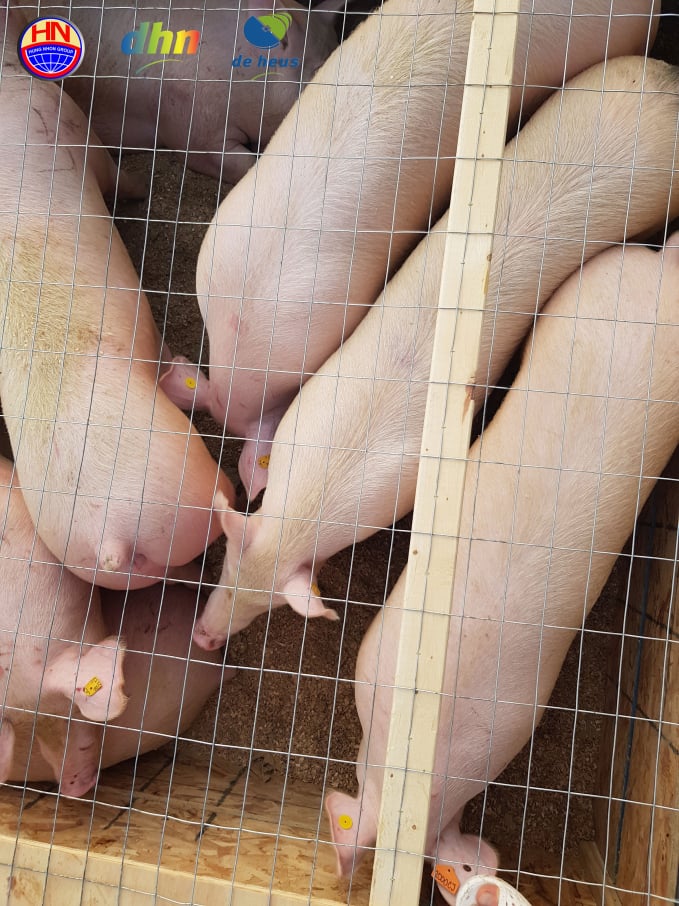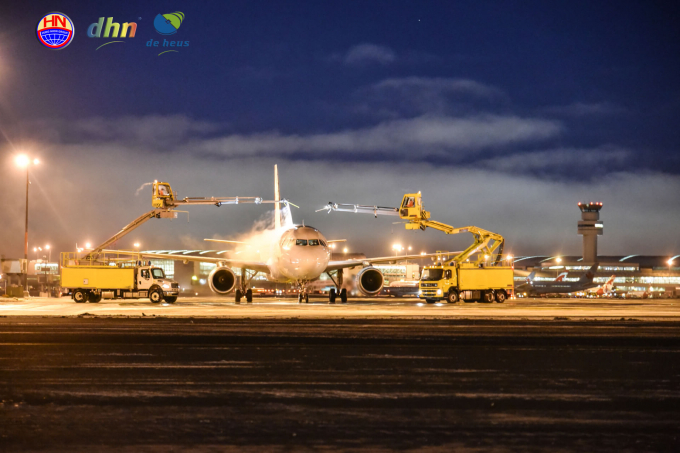May 20, 2025 | 08:36 GMT +7
May 20, 2025 | 08:36 GMT +7
Hotline: 0913.378.918
May 20, 2025 | 08:36 GMT +7
Hotline: 0913.378.918

Shipment of 1,250 pigs imported directly from Topigs Norsvin - a world leading brand in providing high quality pig breeds.
On the evening of October 4th, 2021, 1,250 high-quality pigs imported by De Heus Group and Hung Nhon Group from Topigs Norsvin, were transported by private plane from Canada to Vietnam, landed safely at Tan Son Nhat International Airport (Ho Chi Minh City).
This batch of breeding pigs includes 1,225 sows, grandparents will be transferred directly to the DHN Dak Lak High-Tech Agricultural Application Complex located in Cu M'gar district, Dak Lak province and 25 boars will be transported to the Gencen pig semen center in Bac Tan Uyen district, Binh Duong province.
In the past, with the domestic pig industry seriously affected by African swine fever (ASF) for a prolonged period of time, along with disease prevention, there is an urgent need to effectively re-herd pigs.
In addition to ensuring biosecurity and hygiene in animal husbandry, stock breeding plays a very important role, because it is the premise of production; it has direct influence on productivity, quality and cost of pig raising is an important foundation to maintain stability of the livestock industry.
According to swine industry experts, in Vietnam, there are still many pig breeds of unknown origin, susceptible to diseases, conditions to ensure biosecurity and breeding pig breeds of grandparents and great-grandparents are poor. Therefore, import of quality piglets and grandparents, then implementing breeding models that ensure compliance with standards and biosecurity, in order to provide the market with a source of quality, disease-free commercial breed, is extremely necessary to stabilize the price of piglets for production.
The batch of 1,250 great-grandparents and grandparents pigs are imported directly from Topigs Norsvin - a world leading brand in supplying high-quality pig breeds, with superior genetic characteristics such as: fast birth, clever rearing; high sow exploitation endurance; piglets are born beautiful, uniform, gain weight quickly; with good adaptability to Vietnam's livestock environment conditions; breeding efficiency is high, production costs are reduced, profits are high; creating healthy, fast growing pigs, good feed conversion ratio and high meat quality.
Because the transportation process requires going through many complicated, meticulous, and strict biosecurity procedures for pigs imported from Canada to Vietnam, in Canada, the batch of pigs was under strict health checks, disease control screening and complete isolation for 30 days at the Canadian veterinary agency by Topigs Norsvin and expert De Heus' technicians.
On the other hand, to utilize the coolest temperature period of the day and minimize the heat shock exposure that may occur due to prolonged transportation under the daytime heat of the South, De Heus Group and Hung Nhon Group arranged a flight to Tan Son Nhat International Airport in the evening to promptly transport the pigs to the farm in the most favorable conditions.

The batch of pigs has been thoroughly and strictly inspected by Topigs Norsvin and technical experts of De Heus.
In the process of preparing to receive the pig batch from the airport and transporting it to the farm, personnel must be isolated at the hotel, not to contact and use pork-related products within 48 hours.
All vehicles transporting the batch of pigs are also cleaned and disinfected continuously and must be isolated for 48 hours. The convoy transporting pigs includes 12 trucks, container trucks, self-propelled cranes, in addition, it is also accompanied by a backup vehicle and a specialized crane throughout the journey to ensure the shipping in event of an accident.
To ensure biosecurity for pigs as well as to take care thirst, hunger and fatigue when transporting from Canada to Vietnam, De Heus Group and Hung Nhon Group have also prepared a gathering spot to transport the pigs, the gathering spot was newly rented, far from residential areas, had never seen use before and was cleaned and disinfected continuously.
At the same time, in order to ensure biosecurity during the transportation from the airport to the farm, De Heus Group and Hung Nhon Group have cooperated with local veterinary authorities that the convoy carrying the pigs passes through pigs to stop away from the quarantine station. After completing inspection and handling quarantine procedures, priority will be given to the convoy to leave the station as quickly as possible.
In addition, the two groups also arranged vehicles to serve drinking water, vehicles to lead the convoy, check for traffic problems and prepare veterinary inspection procedures at quarantine stations to minimize the time the convoy is stopped on the road.
At the farm, cages, livestock equipment and tools are used completely new, disinfected continuously for 7 days before receiving the batch of pigs to the farm. All clothing and other livestock equipment must also be soaked in 90 degrees alcohol.

The batch of pigs was arranged to arrive at Tan Son Nhat International Airport in the evening to minimize possible heat shock.
It is expected that after being put into production, this herd of grandparent and great-grandparent pigs will annually supply to the market with about 25,000 broodstock and commercial gilts, contributing to a sufficient source of quality breed and safe for the Vietnam pig industry, solving the scarcity of high-quality breeding pigs with optimal productivity in livestock production.
After the project enters operation, about 25,000 broodstock and gilts will be supplied to the market annually. Additionally, the project also creates job opportunities for nearly 300 ethnic minorities in Dak Lak province, training human resources with expertise in high-value livestock, organic farming with modern technology, contributing to the overall economic development of the province.
Simultaneously, a modern livestock model will be built as a standard model for the Central Highlands, the Southeast and other regions of the country.
The DHN Dak Lak hi-tech agricultural complex produces high-quality agricultural products in a closed chain including selection and production of piglets; automatic pig slaughter plant; produces organic animal feed; organic fertilizers and trading livestock products with top quality in Vietnam and aiming to export to the Southeast Asia region.
The project has a total investment capital of about 60 million USD for the entire period of 2019-2025 (equivalent to 1,500 billion VND). This is also the largest pig raising project in the Central Highlands to date. Located in the complex of DHN Dak Lak hi-tech agricultural complex, the high-yield pig breeding farm project in Dak Lak has a capacity to raise 2,500 great-grandparent and grandparent pigs carefully selected to ensure good genetic resources.
The entire breeding process is strictly controlled, in compliance with the reuirements on food sources, vaccinations, and techniques in order to create and meet the increasing demand for breeding commercial grandparent and parent pigs of high quality, improving livestock production efficiency, creating a source of clean agricultural products for the market, establishing disease-free breeding areas.
Here is a photos collection of 1,250 great-grandparent and grandparent pigs imported from Canada to Vietnam:
Translated by Nguyen Hai Long

(VAN) Vietnam aims to become a 'leader' in the region in the capacity and managing effectively soil health and crop nutrition.
![Reducing emissions from rice fields: [Part 1] Farming clean rice together](https://t.ex-cdn.com/nongnghiepmoitruong.vn/608w/files/news/2025/05/05/z6509661417740_a647202949c539012a959e841c03e1d3-nongnghiep-143611.jpg)
(VAN) Growing clean rice helps reduce environmental pollution while increasing income, allowing farmers to feel secure in production and remain committed to their fields for the long term.
/2025/05/19/5136-1-144800_230.jpg)
(VAN) The Nghe An Provincial People's Committee has just approved the list of beneficiaries eligible for revenue from the Emission Reductions Payment Agreement (ERPA) in the North Central region for the year 2025.

(VAN) 14 out of 35 domesticated elephants in Dak Lak province have had their living conditions improved, with 11 of them currently participating in the non-riding elephant tourism model.

(VAN) Muong Nhe Nature Reserve hopes that being upgraded to a national park will lay the foundation for forest protection efforts to be carried out in a systematic, modern, and sustainable manner.
/2025/05/16/3923-2-171845_52.jpg)
(VAN) Lower costs, higher yields, and improved soil quality are outstanding benefits that soybeans bring when integrated into the crop rotation system.

(VAN) The 'For a Green National Environment' programme aims to promote a green lifestyle, support businesses in implementing ESG practices, and turn Net Zero commitments into concrete actions.